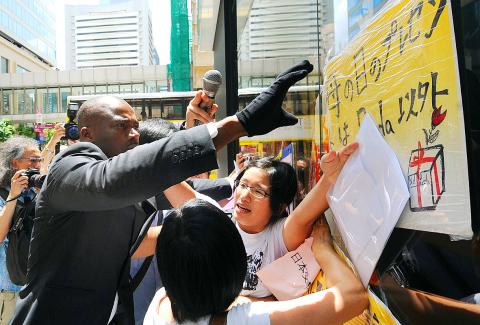Italian luxury fashion house Prada yesterday made a lackluster stock market debut in Hong Kong amid choppy global markets and waning investor interest after a string of blockbuster initial public offerings (IPO).
The family-controlled firm’s stock opened just 0.25 percent higher at HK$39.60 compared with its IPO price of HK$39.50.
After a little bit of intraday movement, it ended the session where it started at HK$39.60, while Hong Kong’s benchmark Hang Seng index rose 1.9 percent.

Photo: AFP
The Milan-based company nevertheless trumpeted its listing debut in Hong Kong — increasingly a favored gateway for foreign companies trying to tap Chinese capital.
“We are the first Italian luxury brand company to list here and this is a landmark event for the Hong Kong stock exchange,” chief executive Patrizio Bertelli said.
“I am positive the Greater China market will be an interesting market for luxury good brands. The first signs are very good,” he told reporters.
Hong Kong Stock Exchange chairman Ronald Arculli lauded the listing as a “good start” for Prada and said the exchange was doing its best to attract quality companies to list in the territory, despite volatile global markets.
The Italian group, which includes the Prada, Miu Miu, Church’s and Car Shoe brands, is the latest high-end fashion brand to tap the huge Chinese market, the world’s fastest-growing market for luxury goods.
However, weak market sentiment had pushed Prada to price its Hong Kong shares at the lower end of its price range and shrink the size of its highly anticipated IPO, raising a lower-than-expected US$2.14 billion.
Prada sold 423.2 million shares after floating 20 percent of its stock. Before the IPO, the brand had been 95 percent owned by the Prada family and executives.
Outside the stock exchange, Prada received some unwanted publicity when two dozen women’s activists staged a protest accusing the group of sexual discrimination and chanted “Only the devil wears Prada! Shame on Prada!”
The protest stemmed from the case of Rina Bovrisse, a 37-year-old former Prada manager in Japan who claimed she was unfairly fired in March last year after being told by a company executive that she was “ugly” and didn’t have “the Prada look.”

TARIFFS: The global ‘panic atmosphere remains strong,’ and foreign investors have continued to sell their holdings since the start of the year, the Ministry of Finance said The government yesterday authorized the activation of its NT$500 billion (US$15.15 billion) National Stabilization Fund (NSF) to prop up the local stock market after two days of sharp falls in reaction to US President Donald Trump’s new import tariffs. The Ministry of Finance said in a statement after the market close that the steering committee of the fund had been given the go-ahead to intervene in the market to bolster Taiwanese shares in a time of crisis. The fund has been authorized to use its assets “to carry out market stabilization tasks as appropriate to maintain the stability of Taiwan’s

STEEP DECLINE: Yesterday’s drop was the third-steepest in its history, the steepest being Monday’s drop in the wake of the tariff announcement on Wednesday last week Taiwanese stocks continued their heavy sell-off yesterday, as concerns over US tariffs and unwinding of leveraged bets weighed on the market. The benchmark TAIEX plunged 1,068.19 points, or 5.79 percent, to 17,391.76, notching the biggest drop among Asian peers as it hit a 15-month low. The decline came even after the government on late Tuesday authorized the NT$500 billion (US$15.2 billion) National Stabilization Fund (國安基金) to step in to buoy the market amid investors’ worries over tariffs imposed by US President Donald Trump. Yesterday’s decline was the third-steepest in its history, trailing only the declines of 2,065.87 points on Monday and

TARIFF CONCERNS: The chipmaker cited global uncertainty from US tariffs and a weakening economic outlook, but said its Singapore expansion remains on track Vanguard International Semiconductor Corp (世界先進), a foundry service provider specializing in producing power management and display driver chips, yesterday withdrew its full-year revenue projection of moderate growth for this year, as escalating US tariff tensions raised uncertainty and concern about a potential economic recession. The Hsinchu-based chipmaker in February said revenues this year would grow mildly from last year based on improving supply chain inventory levels and market demand. At the time, it also anticipated gradual quarter revenue growth. However, the US’ sweeping tariff policy has upended the industry’s supply chains and weakened economic prospects for the world economy, it said. “Now

An employment discrimination lawsuit against contract chipmaker Taiwan Semiconductor Manufacturing Co (TSMC, 台積電) might soon be expanded after a hearing in a federal court in San Jose, California, on Tuesday to add 15 plaintiffs to the case. According to a court document, the lawsuit, which was refiled in November last year as a form of a class action with 13 plaintiffs in California, wants to add 15 plaintiffs from Arizona, where TSMC is building up its wafer fab capacity. TSMC first committed between 2020 and last year to invest US$65 billion in three advanced wafer fabs in Arizona. It then pledged an